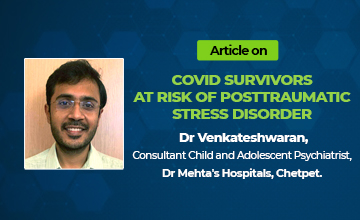Covid 19 has caused an unprecedented impact on the physical, mental health and well being of mankind. The impact is secondary to an increase in stress level due to economic loss, loss of social life, staying at home for a prolonged period, poor lifestyle, addictions and high media consumption. It has led to emotional and behavioural problems in adults and children, developmental problems in children.
Post Traumatic Stress Disorder (PTSD) is the most common mental health impact in people who had near-death experiences or witnessed to their loved ones during the pandemic. Symptoms include, emotional numbness, panic attacks, nightmare and re-experience (suddenly feel the trauma is happening again) and symptoms are increased by reminders of the trauma and they will start avoiding many situations leading to dysfunction. It is an easily treatable condition and chronic PTSD has lots of physical and mental health implications.
The secondary problem to the ongoing pandemic is adjustment disorder where people experience heightened levels of depressive, anxiety and behavioural symptoms, especially in children. People who have pre-existing mental health issues and chronic physical illness are at risk for the same. In adjustment disorder, symptoms are chronic and improve with improvement with life situations.
It is generally suggested to have physical activity, regularly, organized routine, taking time off from the work, reducing expectations consciously, engaging in possible leisure activities, cutting of gadgets and reducing negative coping as alcohol and smoking will help in improving mood and anxiety.
Management of negative thoughts is important in mental health well-being. Negative thoughts are the result of low mood, less engaging lifestyle, personality factors and excessive stress in the environment. It is advised to listen to our mind (being mindful) about negative thoughts and try to challenge with facts and focus on things that we can control rather than worrying about things that are not. It will produce positive thinking patterns and in turn, improve our mood and well being.
It is also advised to self regulate “negative” emotions. As discussed, we should be mindful of negative emotions, like anger, low mood and anxiety. We should constantly self monitor our mood state and try to involve in self-regulation. ( for e.g. when we are depressed, we can increase physical activity, consciously avoid skipping routine, to activate us, when we are angry or anxious, we can practise abdominal breathing or positive visual imagery to bring calmness)
If symptoms are pervasive, for more than 2 weeks, or severe enough to cause disruption in daily functioning, or lead to high-risk behaviours like suicidal ideas or addictions then the possibility of clinical depression is present and treatment should be initiated at the earliest.
If worries are persistent, for more than 6 months, or self-limiting, like causing intense panic attacks (palpitation, breathing difficulty, impending doom etc. Without medical explanation) or causes stress headaches, body aches, loss of concentration, then it is possibly clinical anxiety disorder and needs professional help.
Substance addictions and gadget addictions are other common mental health impacts of a pandemic. It is usually started as part of coping or relaxation from routine but over time, become an independent mental health disorder. We have to be conscious about the increasing trends in use, impact on work, family, and health.
Gadget addiction has become a burden in adolescents and young adults. Addiction is usually towards, online games, social media or porn. Adults should be mindful of the increase in use and constantly check their overall use on their mobile. Adolescents should have adequate monitoring including avoiding use in bedroom/dining, preventing displacement (like compromising family time, studies, meeting friends), monitoring content before exposing them, model media behaviours from adults will help to reduce gadget addiction.
Domestic violence is also increasing significantly. It is usually the consequence of other mental health issues, addiction and personality factors and should be dealt with professional help in the early stage to prevent permanent separation.
If we are aware of the problems, taking simple steps to maintain positive mental health and taking professional help at the earliest in terms of red flags will help in reducing long term mental health morbidity.
Article by
Dr Venkateshwaran,
Consultant Child and Adolescent Psychiatrist,
Dr Mehta’s Hospitals.

